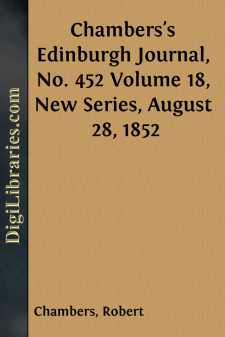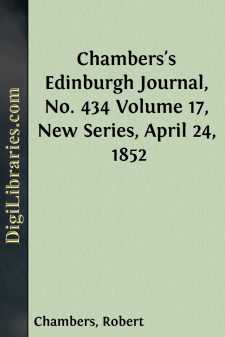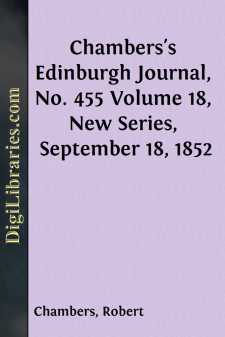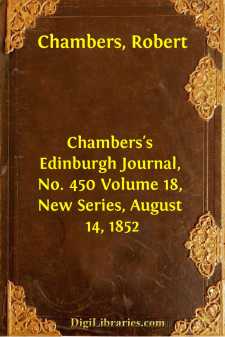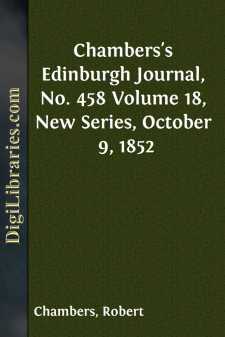Categories
- Antiques & Collectibles 13
- Architecture 36
- Art 48
- Bibles 22
- Biography & Autobiography 813
- Body, Mind & Spirit 142
- Business & Economics 28
- Children's Books 15
- Children's Fiction 12
- Computers 4
- Cooking 94
- Crafts & Hobbies 4
- Drama 346
- Education 46
- Family & Relationships 57
- Fiction 11829
- Games 19
- Gardening 17
- Health & Fitness 34
- History 1377
- House & Home 1
- Humor 147
- Juvenile Fiction 1873
- Juvenile Nonfiction 202
- Language Arts & Disciplines 88
- Law 16
- Literary Collections 686
- Literary Criticism 179
- Mathematics 13
- Medical 41
- Music 40
- Nature 179
- Non-Classifiable 1768
- Performing Arts 7
- Periodicals 1453
- Philosophy 64
- Photography 2
- Poetry 896
- Political Science 203
- Psychology 42
- Reference 154
- Religion 513
- Science 126
- Self-Help 84
- Social Science 81
- Sports & Recreation 34
- Study Aids 3
- Technology & Engineering 59
- Transportation 23
- Travel 463
- True Crime 29
Chambers's Edinburgh Journal, No. 452 Volume 18, New Series, August 28, 1852
by: Robert Chambers
Description:
Excerpt
THE BETROTHAL.
Frances Seymour had been left an orphan and an heiress very early in life. Her mother had died in giving birth to a second child, which did not survive its parent, so that Frances had neither brother nor sister; and her father, an officer of rank and merit, was killed at Waterloo. When this sad news reached England, the child was spending her vacation with Mrs Wentworth, a sister of Mrs Seymour, and henceforth this lady's house became her home; partly, because there was no other relative to claim her, and partly, because amongst Colonel Seymour's papers, a letter was found, addressed to Mrs Wentworth, requesting that, if he fell in the impending conflict, she would take charge of his daughter. In making this request, it is probable that Colonel Seymour was more influenced by necessity than choice; Mrs Wentworth being a gay woman of the world, who was not likely to bestow much thought or care upon her niece, whom she received under her roof without unwillingness, but without affection. Had Frances been poor, she would have felt her a burden; but as she was rich, there was some éclat and no inconvenience in undertaking the office of her guardian and chaperone—the rather as she had no daughters of her own with whom Frances's beauty or wealth could interfere; for as the young heiress grew into womanhood, the charms of her person were quite remarkable enough to have excited the jealousy of her cousins, if she had had any; or to make her own fortune, if she had not possessed one already. She was, moreover, extremely accomplished, good-tempered, cheerful, and altogether what is called a very nice girl; but of course she had her fault like other people: she was too fond of admiration—a fault that had been very much encouraged at the school where she had been educated; beauty and wealth, especially when combined, being generally extremely popular at such establishments. As long, however, as her admirers were only romantic schoolfellows and calculating school-mistresses, there was not much harm done; but the period now approached in which there would be more scope for the exercise of this passion, and more danger in its indulgence—Frances had reached the age of seventeen, and was about to make her début in the world of fashion—an event to which, certain as she was of making numerous conquests, she looked forward with great delight.
Whilst engaged in preparations for these anticipated triumphs, Mrs Wentworth said to her one day: 'Now that you are coming out, Frances, I think it is my duty to communicate to you a wish of your father's, expressed in the letter that was found after his death. It is a wish regarding your choice of a husband.'
'Dear me, aunt, how very odd!' exclaimed Frances.
'It is rather odd,' returned Mrs Wentworth; 'and, to be candid, I don't think it is very wise; for schemes of this sort seldom or never turn out well.'
'Scheme! What scheme is it?' asked Frances with no little curiosity.
'Why, you must know,' answered her aunt, 'that your father had a very intimate friend, to whom he was as much attached all his life as if he had been his brother.'
'You mean Sir Richard Elliott....


